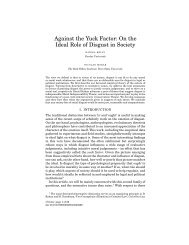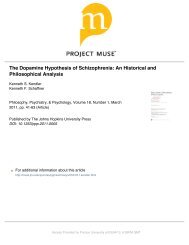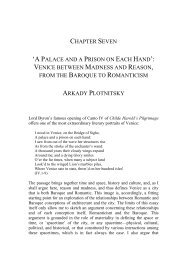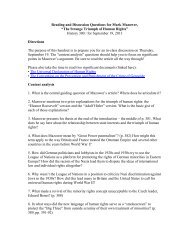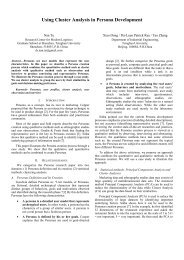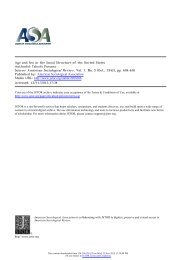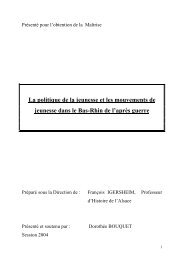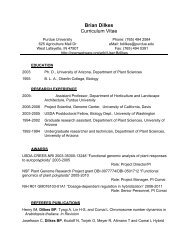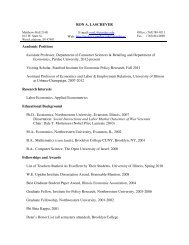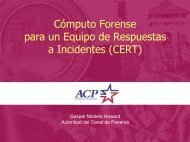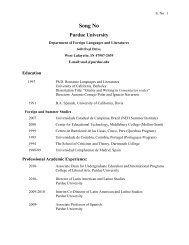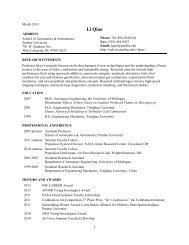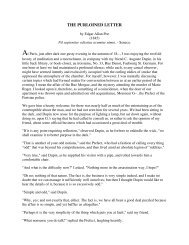Lexical Semantics of Adjectives - CiteSeerX
Lexical Semantics of Adjectives - CiteSeerX
Lexical Semantics of Adjectives - CiteSeerX
Create successful ePaper yourself
Turn your PDF publications into a flip-book with our unique Google optimized e-Paper software.
13<br />
fact that the adjectives inherit much <strong>of</strong> the noun meaning does not come as a shocking surprise, and<br />
the fact that these features <strong>of</strong> the adjectives are shared by the related nouns seems less significant.<br />
(12) +def: Markovian, Mexican -def: national, feline<br />
+concrete: aquatic, lunar -concrete: dramatic, linguistical<br />
+animate: senatorial, Chomskian -animate: rural, electric<br />
+human: Markovian, presidential -human: Bostonian, bovine<br />
+masc: paternal, masculine +fem: maternal, feminine<br />
+common: financial, monthly -common: Persian, Chomskian<br />
Similarly, the (9v) observation on the adjectives inheriting, in a sense, the thematic roles (cases, as<br />
per Levi 1978: 27) from the originating noun is both true and trivial (13):<br />
(13) agentive: presidential refusal, editorial comment<br />
objective: constitutional amendment, oceanic study<br />
locative: marginal note, marine life<br />
dative [genitive?]/possessive: feminine intuition, occupational hazard<br />
instrumental: manual labor, solar generator<br />
The primary reason (9iii-v) are more or less superfluous is that these nominal properties are not<br />
actually useful for describing adjectives. They affect the syntactic behavior <strong>of</strong> nouns in important<br />
ways. With adjectives, they may at most marginally influence the rare use <strong>of</strong> oblique constructions,<br />
such as prepositional phrases, as adjective modifiers. Miller and Fellbaum (1991: 209) are right<br />
when, crediting Levi (1978) for the criteria for distinguishing the nonpredicating adjectives, they<br />
disregard these three criteria.<br />
(9vi) is a statement about the nonnominalization <strong>of</strong> nonpredicating adjectives. It provides an important<br />
diagnostic test for predicativeness/nonpredicativeness: only the former adjectives can be<br />
nominalized, as in (14i) vs. (15i) or (14ii) vs. (15ii) (cf. Levi 1978: 29, Miller and Fellbaum 1991:<br />
209, Bartning 1976: 112ff, Dell 1970: 189ff, and, <strong>of</strong> course, Quirk et al. 1985: 436 again).<br />
(14) (i) the rudeness <strong>of</strong> the engineer<br />
(ii) the politeness <strong>of</strong> the lawyer<br />
(15) (i) *the mechanicalness <strong>of</strong> the engineer<br />
(ii) *the corporateness <strong>of</strong> the lawyer<br />
The nonpredicating/predicating distinction has been dealt with by various schools <strong>of</strong> linguistic<br />
thought, and it was taken to the extreme by the Montegovian tradition, where the nonpredicating<br />
and predicating adjectives were assigned to two different syntactic categories (Montague 1974:<br />
211ff): attributive adjectives make common nouns out <strong>of</strong> common nouns (CN/CN); predicative adjectives<br />
are one-place predicates (t//e). Siegel (1976a,b, 1979), the main Montegovian voice on adjectives,<br />
discusses the ambiguity <strong>of</strong> beautiful in (16) as that between the absolute meaning (17i)<br />
and relative meaning (17ii):<br />
(16) Olga is a beautiful dancer<br />
(17) (i) Olga is beautiful and Olga is a dancer<br />
(ii) Olga is beautiful as a dancer (dances beautifully)<br />
The absolute meaning is also known as ‘intersective’ and the relative meaning as ‘nonintersective’



